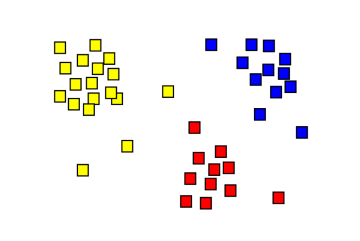Cluster What?
Written By: Henry St. Clair
Information systems literacy comes front and center in a new work of theatre that was unveiled at Toronto’s 2018 Fringe Festival. The play, written by the University of Toronto’s Faculty of Information’s own Professor David Philips, is affectionately titled “Cluster F****d”. Philp’s piece attempts to lead the audience into the mechanics and consequences of commercial surveillance practice, as they are currently deployed. The play holds particular focus on both the practicality and the absurdity of subjecting populations to cluster analysis.
What is Cluster Analysis?
Cluster analysis is a common statistical process employed in data-mining by which disparate sources of data on individuals can be made meaningful. This meaning is extrapolated by forming data points into clusters of affinity, and then naming and/or demarcating those clusters. For instance, such disparate information like gender, age, education level, and brand of car owned, can be so arranged to maximize the clotting of individuals into groups along various axis. The trick (and mysticism) of cluster analysis is deciding and weighting the attributes of an analysis so as to create distinct clumps of individuals united by similar attributes, while ensuring that each grouping is distinct from other clumps of individuals
As with any classification practice, cluster analysis does not identify pre-existing groups, but brings those very groups into existence through naming clusters that have been made to occur within the data. From these clusters are created “populations”. It is expected that by sharing certain attributes, each member of a population will statistically follow along certain paths and preferences. In short, cluster analysis performs the same kind of stereotyping of people which individuals unconsciously perform daily, but on massive industrial scale with information no individual would be able to make sense of.
What is “Cluster F****d”?
Full of gumption, Philip’s “Cluster F****d” ran at a mile a minute through the perpetual indignity we are subjected to, as we are speculated upon and (arbitrarily) classified via cluster analysis, for the purposes of better ad-targeting. Upon a minimal but innovatively employed set of a few modular chairs, four plain-clothed actors bombarded the audience with tasty factoids lifted directly from the professor’s own “Interventions in Surveillance Workshop” offered at the Faculty of Information. Perhaps in an attempt to mirror the ceaseless data we forfeit every minute to massive corporations, the play itself appeared to have no beginning, middle, or end. Rather, it was a flaying mass of information, leaving even theinformation professionalsin the audience unclear on the logic of what was occurring. All of this combined into an uneasy simulacrum of a University seminar intermixed with the over-enthused antics of an improv night and the self-righteousness of a slam-poetry gathering.
The highlight of the play was a scene conjuring the bridge dynamics of golden-age Star Trek, as the actors embodied a faceless advertising “they” who were analysing a women’s Spotify activity to determine what to sell her. The woman’s eventual joy at being sold (and receiving) a container of Häagen-Dazsice-cream seemed to sum up the essential dual nature of the advertising systems that surround us; we are certainly being manipulated, but what else is there to do if our sole means of self-expression is the acquisition and consumption of products?
Will it blend?
The Roman poet Horace advised that the supreme goal of art was to “delight and instruct.” Yet, rarely do the motivations of pleasing spectacle and public education align in a satisfying effect. “Cluster F****d” did indeed reveal (as stated in the production’s own words) “what happens when a university professor writes a play”.


